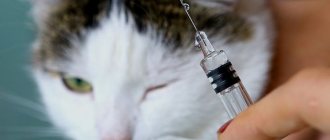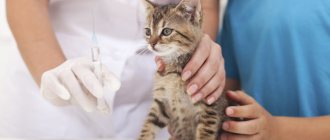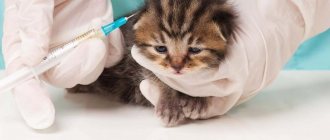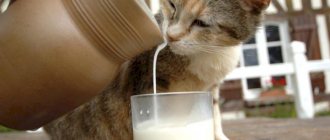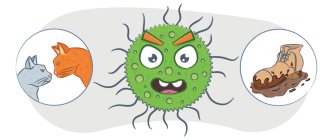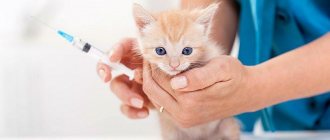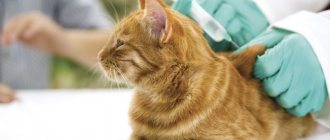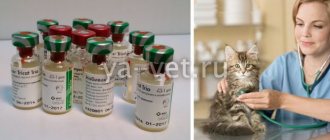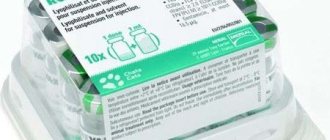10316Administration
When a small purebred kitten appears in the house, the owner immediately thinks about vaccinating his pet. Indeed, in our time there are many diseases that are accompanied by unpleasant complications. And first of all, you need to know the schedule of vaccinations for British kittens, so that later it will be easier to navigate their order.
Your pet's body is very susceptible to many infectious and viral diseases, so the importance of vaccination is essential. Even if a British pet spends all its time in a house or apartment, there is still a chance of becoming infected. Therefore, for prevention, it is better to get vaccinated to protect your animal from possible diseases.
Early development
With mother's milk, babies receive all the necessary substances that protect small pets from possible infectious diseases.
Therefore, the first vaccination of a British kitten during this period is not recommended, since the process of creating immunity in it can be disrupted. And thanks to this factor, many owners expect their pet to reach a certain age.
© shutterstock
Viral diseases against which cats are vaccinated
The main viruses against which you should be vaccinated:
- Panleukopenia, rhinotracheitis, calicivirus - included in one vaccine;
- Rabies virus.
Additional vaccinations:
- Leukemia virus, FelV - if the pet has access to the street;
- Leukemia and chlamydia virus - if the pet will participate in breeding.
Description of diseases:
- Panleukopenia is distemper, a viral disease of cats that affects the gastrointestinal tract, heart, respiratory organs, causing dehydration and general intoxication of the body;
- Viral rhinotracheitis is a herpes virus, an acute disease that affects the eyes and respiratory organs. All breeds of all ages are susceptible to the disease. Morbidity – 50%, mortality 5-20%;
- Calicivirus is a viral disease that affects the upper respiratory tract, characterized by ulcers in the mouth, tongue, nose, in severe cases pneumonia, rarely arthritis;
- Rabies is a fatal infectious disease that affects the brain and spinal cord of all mammals;
- Chlamydia is an infection manifested by eye diseases (conjunctivitis), inflammatory processes of the upper respiratory tract (rhinitis, pharyngitis, bronchitis), rarely affecting the reproductive system;
- Lichen - ringworm, microsporia, trichophytosis, the disease is characterized by the formation of hairless areas, peeling, redness, itching of the skin;
- Viral leukemia – leukemia, FeLV, feline leukemia, feline tumor disease;
- Viral immunodeficiency - FIV, FIV, feline AIDS, latent infection, affects the immune system, and in the final stages the nervous system;
- Viral peritonitis – IPK, VIPK, FIP, systemic viral disease. Two forms of the disease: wet - inflammatory fluid accumulates in the abdominal cavity, dry - the virus attacks various organs, kidneys and spleen. There is no treatment, the outcome is almost always fatal;
- Bordetellosis is an infectious disease manifested by inflammation of the trachea, bronchi and lungs. Respiratory problems: cough, shortness of breath, fever. Often occurs with other infections.
Features of vaccination among the British
The first vaccination should be done at 10-12 weeks, just when the pet has grown and become stronger. This vaccine can protect your cat from:
- calcivirosis;
- rhinotracheitis;
- panleukopenia.
This procedure must be repeated after 2-3 weeks and also add a rabies vaccination.
Regarding the British, their vaccination period is slightly different from other cats. The first vaccinations for British kittens are given at 8-9 weeks, the list of which is the same as for other cats. Re-vaccination is not carried out, as is rabies medicine, which is given much later.
The next stage is carried out already at 6-7 months, when the teeth change. Then the veterinarian carries out a revaccination, and if it is a British person, then he needs to be additionally vaccinated against rabies.
In an earlier period, vaccination is impossible, since teeth change at 4-6 months, which is why the animal’s body is weakened. If you do get vaccinated, complications may arise after it related to your pet’s health.
How can infection occur?
Infection can occur: through direct contact between cats, through ticks, fleas, blood-sucking insects, small rodents, sexual contact, by airborne droplets, in utero from a sick mother, through saliva and blood, dishes, clothing | people's shoes in veterinary clinics. As you can see, there are plenty of ways to transmit the disease. Therefore, vaccination is a way to create immunity that allows you to protect against infections and minimize the infection of British cats with dangerous diseases. Vaccination does not provide 100% protection against infection, but it creates immunity that will help alleviate the course of the disease and reduce the likelihood of complications. A weakened immune system can be due to stress, a chronic disease, concomitant infection with helminths, due to taking certain medications, or failure to schedule a cat’s vaccinations.
Live and “dead” vaccines are used for vaccination. Live – contain a living but weakened infectious agent; the body independently produces immune bodies in response to its administration. A dead vaccine contains inactivated microbial agents that cause the body to produce antibodies immediately after they are administered. They are less popular because... provide limited and short-lived immunity to the animal’s body.
Preparing for vaccination
Every owner remembers when to vaccinate their British kittens. But some time before this, preparations for vaccination need to be made. And the first thing to do is to remove helminths from your pet.
An important point is getting rid of parasites - fleas and ticks.
© shutterstock
In the case of small British pets, they need to be bathed with a special shampoo, while adults can use the appropriate products.
And the last stage is an examination by a veterinarian on the day of vaccination. He will evaluate the condition and appearance of the cat, since animals must be completely healthy during this procedure. British kittens are also vaccinated.
How much do kitten vaccinations cost?
The cost of vaccinations for kittens depends on the quality of the vaccine, the service provided by the veterinary clinic, as well as the location of the veterinary clinic. So, vaccinating a kitten in Moscow or St. Petersburg will by default be more expensive than in the region. But in Europe and the USA, the prices for kitten vaccinations are completely different.
Therefore, when you have decided to vaccinate your kitten and have chosen a vaccine, call the veterinary clinics you are interested in and ask how much it costs to vaccinate a kitten with this or that vaccine. They will definitely tell you how much the first vaccination for a kitten with subsequent revaccination costs. Next, choose the cheapest option, because it doesn’t matter which veterinary clinic you go to for vaccinations, the main thing is that the vaccine injected is exactly what you need.
Deworming and its features
To do this, it is necessary to carry out a procedure for cleansing the animal’s body of worms 2-3 weeks before the first vaccination. This is done as follows: anti-helminth medicine in the form of drops or tablets is added to the pet’s food. This is the initial stage of treatment, after which most adult worms will pass in the feces.
After 10 or 12 days, you can repeat the procedure to kill young, newly hatched worms. And only 5 days after the second stage, you can safely vaccinate.
If you are not sure whether your British kitten has worms, there is an easy way to find out. To do this, you need to take a stool test, through which you can determine this. And only then carry out the procedure of cleansing the animal’s body of helminths. After all, unnecessary use of such medications can negatively affect your kitten’s health.
Tablets, drops for worms
Viruses are not the only danger for cats. In addition, animals are susceptible to infection with external and internal parasites, regardless of whether they live at home or walk outside. The table below shows drugs to combat parasites and the age at which these drugs can be used.
Cats that live at home and have access to the outdoors should undergo timely treatment for external and internal parasites. They must also receive the necessary screenings and vaccinations. This must be done in veterinary clinics, which guarantees a high-quality examination, high-quality vaccines, timely assistance in case of unwanted reactions, an official seal and signature in the veterinary passport. The opinion that a pet does not need any of the above is erroneous and threatens with dire consequences.
Vaccination dates
After the first necessary vaccinations have been given to the Briton, you need to stay at home with your pet for some time, since during this period the animal’s body is weakened. And after that, you need to:
- revaccinate after a month;
- this is followed by 1 month of quarantine, during which all contact with other animals and people must be excluded;
- After 1 year, it is necessary to vaccinate again against the same diseases and additionally against rabies.
These stages constitute the vaccination schedule for British kittens. Therefore, you need to remember them in order to carefully monitor your pet and its vaccination.
© shutterstock
Vaccines | vaccinations for cats
Which vaccine should I choose? Veterinary clinics offer different types of vaccines, with their own advantages and disadvantages. From Hanna Kennel vaccinates its pets with Purevax and Rabisin vaccines produced in France; these are the best vaccines now.
How much does a vaccination cost? Imported vaccines are many times more expensive than domestically produced ones, due to the quality and degree of purification. The current price of vaccination in veterinary clinics includes: examination of the kitten, cost of the vaccine and injections. Check with local doctors.
Approximate cost of vaccines in 2021:
- Multifel-4 – 6 $;
- Rabisin – $3.5;
- Nobivac Tricat Trio – $9.5;
- Nobivac Rabies – $4;
- Polivac TM – 1.5
- Purevax RCP – $14;
- Purevax RCPCh – $17;
- Felocell CVR – $8.
Rabies vaccinations
Such vaccination is carried out to avoid possible infection of the cat. It’s the same with the British, because their body is most likely to become infected. And if this happens, then through a scratch or saliva the virus can spread to other animals or even to humans. Therefore, rabies vaccination is an annual necessity, thanks to which you can protect yourself , your family and other pets from this disease. The validity of this vaccine on the British body is one year, after which it is necessary to vaccinate again.
What happens if you don't get vaccinated?
Vaccination is an important preventative procedure that minimizes the risk of contracting dangerous viruses and infections. Refusal to vaccinate an animal is like playing Russian roulette, which is especially true for cats that regularly visit the street.
If your pet never goes for a walk and does not come into contact with other animals, it is recommended to vaccinate against at least the three most dangerous infections transmitted by small rodents, birds and dust that settles on clothes, shoes and household items in the house.
A kitten can become infected with rabies only when the saliva of a sick animal gets into the blood of a healthy one. As a rule, this can only happen as a result of a bite from an infected cat or dog. If your cat never goes outside, the risk of contracting this deadly disease is fortunately negligible.
But we should not forget that cats are very dexterous, curious and brave animals. An accidentally unlocked door or an open window - and here it is, the long-awaited access to freedom. By running out into the street or even into the entrance, a pet can pick up an insidious infection that quickly develops into a deadly disease.
Whether your British cat needs vaccinations is up to you to decide! But remember, if you refuse to vaccinate your animal, you expose it to serious risks!
Kitten's reaction to the vaccine
Immediately after your British cat's vaccination, the following changes may occur:
- there is lethargy, apathy and slowness in movements;
- excessive sleepiness of the animal;
- lack of appetite;
- allergic reactions are possible.
If kittens are vaccinated on time, the reaction indicated in the last paragraph is very rare. Since in most cases the cat tolerates vaccination easily. And after 6-7 hours or, in extreme cases, a day later, it returns to its previous state . If you still notice some symptoms (swelling of the throat), you should immediately contact a veterinarian.
Is there a fever after vaccination?
Children may develop a fever after receiving the polio vaccine. This reaction is considered normal and indicates that the body has begun to produce antibodies necessary to fight the virus. A slight increase in body temperature is observed in 1-4% of patients. The temperature may rise to 37.5-38.6 degrees. If the readings exceed a moderate level, then you should take an antipyretic drug.
Vaccination against tuberculosis: pros and cons
Disputes regarding BCG vaccination have been going on for many years. Several questions raise doubts:
- What does the vaccine protect against ? Even full BCG vaccination does not protect against infection with tuberculosis bacteria. A child will sooner or later become infected with pathogenic mycobacteria, but they will be asymptomatically present in the lungs, not making themselves known and being contained by the immune system. The strength of the immune system and the body's reaction to these microbes are checked using Mantoux tests.
- How long does the vaccine last ? Children are recommended to strengthen their immunity at the ages of 7 and 14 years, if by this time the body has not become acquainted with mycobacteria (Mantoux test - negative). In this case, BCG revaccination is carried out, and the immune system receives an additional stimulus, renewing immune responses.
- When is the first injection given ? Many parents believe that vaccination in the maternity hospital is too early. In the first months of life, the baby has little contact with strangers and cannot get sick. But tuberculosis experts cite statistics - many adults who consider themselves healthy actually suffer from this infection, are not treated, secrete mycobacteria and can infect the baby. Among them may be grandparents, close family friends. Source: N.M. Koretskaya Tuberculosis in children and adolescents in modern conditions // Siberian Medical Review, 2010
It is known that the earlier contact with tuberculosis bacilli occurs, the higher the risk of complications of infection. Therefore, vaccination is indicated so early that the immune system has time to develop antibodies to dangerous bacilli.
Carrying out BCG: according to the calendar and individually
The vaccination is given 3-4 days after birth, only with the written consent of the parents. If a child has contraindications (temporary or permanent), he is given a medical exemption with a note on the exchange card. In the future, if there are no longer any contraindications, the child is immunized according to an individual schedule. The vaccination is done separately from all other vaccines, on a separate day. It is important to carry it out as early as possible in the first year so that the immune system begins to form.
There are two versions of the vaccine - BCG and BCG-M (the dose is halved in it). BCG-M is recommended for a weakened or low-weight child; they are vaccinated according to an individual calendar after some time.
Contraindications for carrying out
As with any vaccination, there are contraindications for BCG. These include body weight less than 2500 g, severe trauma during childbirth, hemolytic disease of the newborn and general infectious pathologies. For revaccination at the ages of 7 and 14 years, the contraindications are as follows:
- previous tuberculosis or bacterial infection;
- positive Mantoux test;
- high temperature, ARVI and any acute diseases;
- oncological diseases;
- previous complications from vaccination. Source: N.V. Krivokhizh Methods of preventing tuberculosis among children and adolescents // Health is the basis of human potential: problems and solutions, 2013, p. 585-602

